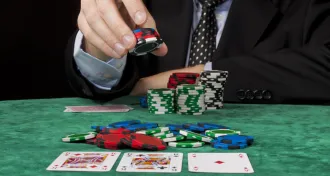Psychology
-
 Animals
AnimalsFeedback
Readers respond to "Collision course" and "The tune wreckers" from our September 21 issue, plus some feedback on the new website.
By Science News -
 Science & Society
Science & SocietyFeedback
Readers respond to our stories 'Distracted Driving' and 'Ratio of a good life exposed as ‘nonsense’'
By Science News -
 Psychology
PsychologyPoker pros’ arms betray their hands
Top players' arm motions when betting provide clues to whether or not they hold strong cards.
By Bruce Bower -
 Psychology
PsychologyBad acts spark a ‘cheater’s high’
Committing low-stakes acts of dishonesty enhances perpetrators’ moods.
By Bruce Bower -
 Psychology
PsychologyBehind the Shock Machine
The Untold Story of the Notorious Milgram Psychology Experiments by Gina Perry.
-
 Psychology
PsychologyPoverty may tax thinking abilities
Scarce funds reduce mental abilities of U.S. shoppers and Indian farmers, experiments suggest.
By Bruce Bower -
 Psychology
PsychologyBehavioral research may overstate results
'Soft' sciences inflate support for what scientists expected to find, data check suggests.
By Bruce Bower -
 Psychology
PsychologyFamiliar faces
"Super recognizers" never forget a visage, an unusual ability that can be put to good use.
By Susan Gaidos -
 Psychology
PsychologyWhat Makes a Hero?
The Surprising Science of Selflessness by Elizabeth Svoboda.
By Sid Perkins -
 Psychology
PsychologyBlood marker may predict suicide
People who killed themselves had higher levels of a gene involved in cell death.
-
 Psychology
PsychologyHighlights from the American Sociological Association annual meeting
Research on social media's reluctant users, marital ideals and single parenthood and intimate victims of cybernastiness presented August 10-13 in New York City.
By Bruce Bower -
 Psychology
PsychologyMental disorder seen as ‘badness, not sickness’
Health workers tend to consider borderline personality disorder a tag for patients who are difficult or impossible to treat.
By Bruce Bower